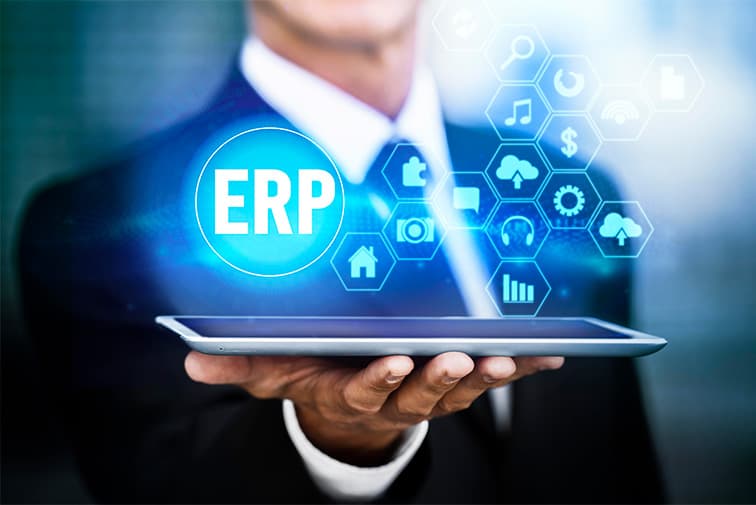What are the Primary Benefits of an ERP System?
What are the Benefits of an ERP System?
There are many advantages to an ERP (enterprise resource planning) solution. Though there are some perceived disadvantages such as increased costs, (we dispell that myth,) the benefits outweigh the perceived disadvantages. Many companies are unaware of what an ERP system can do. ERP software is used to create visibility into the company data, simplify operations, and streamline your business processes. We prepared an analysis of the most important benefits of an ERP software.
1. Total Visibility
To be able to see into your business processes is more valuable than an everyday commodity. Every business needs to be able to look at data from various departments, and how they are interacting. This is the main benefit of ERP software. It allows a business to control inventory levels based on the data they receive. This provides the company access to information that will allow them to forecast, and make better decisions when purchasing future inventory, in turn, saving money. Using reports generated from the system, you can analyze and compare production, tracking, and workflow within every department. A huge aspect of any successful business is the ability for the different departments to interconnect. This is done through collaboration that is provided by an integrated ERP solution.
2. Simplified Business Processes
A simplified business process allows a company to streamline their business operations. When a company can standardize their processes, it provides a greater efficiency and potential ROI. Because the processes are automated, there’s no room for common errors, duplicated content, or forgetting the necessary processes with the right ERP solution. Employees get to have access to data whenever they need it, so they can make informed decisions without having to wait for time-consuming, costly email responses. With customizable features, each department can see what they need to, without seeing a flood of irrelevant information. Some ERP solutions like Kechie, even provide customizations down to the user-level, so that you can get into the software and see only what you want. Real-time data, with real-time access allows businesses to focus on what really matters in their companies.
3. Fully Integrated ERP Solution
An ERP solution that is already Fully-Integrated is much easier to work with, than purchasing various pieces of software, trying to connect them together. You get real-time data, automatic updates, and accurately communicated data. This is important when it comes to streamlining any business. Employees need a consistent user-interface from an easy to use software that won’t require much training. You might think that all ERP software is fully integrated based on the definition, but not necessarily. When a software is fully integrated, that means you don’t have to have different software to try to accomplish your everyday tasks. While it is important to have third party integrations (ex. Shopify, Woo Commerce,) it’s also just as important to control your inventory without having to customize the software with a separate module, hoping it will work.
ERP software has many benefits that let you get insights into your business to make the best decisions. By streamlining your operations, you are increasing your ROI and improving your workflow, as well as, the collaboration of your departments. When your business is fully optimized by an ERP solution like Kechie ERP, it can drive increased profitability, streamline operations, and let you focus on what matters to your business.
9 Benefits of an Integrated ERP System

Benefits of an Integrated ERP (Enterprise Resource Planning) System
Many companies will get started with a very basic internal management system to track their business processes such as sales orders, invoices, inventory, etc. In fact, many companies will initially perform these tasks using an Excel spreadsheet because it is quick to implement and most people already know how to use it.
However, as companies grow they often start adding software to their management systems one at a time and end up with a patchwork of different unconnected programs that do not communicate with each other. These can be separate Excel spreadsheets or special purpose programs such as customer relationship management (CRM), inventory tracking or other auxiliary programs that are installed to help with specific activities. Each time a new unconnected program is added, a company will need to consider how they will communicate needed data from one module to another. This will usually be done manually, but other times they will need to purchase or create additional software to make sure this communication occurs.
Too many companies will just evolve into this situation as their company grows, instead of realizing that there can be a lot of drawbacks running a company with a patchwork of different, incompatible programs. These drawbacks can hurt a company in various ways.
With multiple systems, a company can end up in a situation where employees have to enter the same piece of data into multiple places because they depend upon different programs that don’t talk to each other. All extra data entry activities take time, reduce productivity, and increase the chance of error that a mistake was made when entering data into one of the programs.
Another problem with multi-systems or solutions is that they can get out of sync. Companies encounter situations where a prospect wants to order something, they check your inventory system and it says that inventory is available. But when the order comes in, they find out that the item was sold earlier and that the inventory system had not yet been updated when the previous order shipped.
Training can be an issue with any system. One of the problems with using separate systems is that the user interfaces can be different. Not only does it take time and effort for employees to learn different systems, but it can also be quite confusing. Employees may not remember which commands go with which system and start entering the wrong commands into a particular system and find it doesn’t work. Not only is this frustrating and causes employee dissatisfaction, but it can hurt your business because these errors will take extra time to fix, and will slow down your overall business operations.
The solution to these overbearing problems is to move to an integrated ERP (Enterprise Resource Planning) solution from a software vendor that offers different modules within the same overall program that automatically communicates the data to each other in real time. These programs will typically include customer relationship management (CRM), sales order entry, inventory, procurement, manufacturing, shipping, invoicing, finance, and other functions all within under the same roof. When specific events happen, like shipment of an order, the event is automatically communicated to the invoicing program in order to start the invoice, as well as the inventory program which will automatically adjust the stock level for the item that was just shipped.
There are many benefits of an integrated ERP solution, including:
- Purchasing an ERP solution that is already integrated is much easier than purchasing various pieces of software and implementing your own solution to connect them together.
- As your business grows, the integrated ERP solution will be able to grow with your business with no additional changes. A business that uses multiple pieces of software may find that some of them will not scale and necessitate replacement of that portion and reintegrating the new software into the rest of the system.
- System access and data security is much easier to control with a single piece of integrated software. Logon ID’s and passwords only need to be added once and there will be less chance of error. Access to individual modules within the integrated software can be controlled with a single access page controlled by a system administrator who can select each user’s access rights on a module-by-module basis.
- System updates will be simpler because the update for all modules will occur at the same time. ERP solutions built from many different pieces may receive many different update packages that may need to be applied at different times. This also increases the risk of an update not being implemented and result in a security hole or a software bug not being fixed on a timely basis.
- The same piece of data does not have to be entered in multiple times. It is automatically communicated to the other modules and the accuracy is guaranteed.
- The information will be accurate in real time. You won’t have to worry about different modules getting out-of-sync and causing other errors.
- Employees using several different modules in the system will see a consistent user interface and won’t require much training to switch from one function to the next. Employees can get up-to-speed with the system a lot quicker and they will make fewer errors in using it.
- Not only will your employee’s productivity increase, but they will have less frustration and higher job satisfaction.
- Your customer satisfaction will increase because orders will be processed more quickly and accurately.
Even though it may seem to be a quick fix in the short term to build up an ERP system from many different software packages, over the long run it will require more work, increase potential for errors, and force your company to implement more frequent updates and upgrades to the various packages. Carefully consider these extra indirect costs when deciding upon a strategy for implementing the ERP function in your company.
If you want to learn more about how an integrated ERP system can improve your overall business, My Office Apps has business specialists available who can help you evaluate your business and uncover improvement opportunities. Most of our team have been using ERP systems for many years under all sorts of different situations. We have been in your shoes and we can leverage our experience to show how a reliable integrated ERP system can make a big difference in your operations.



